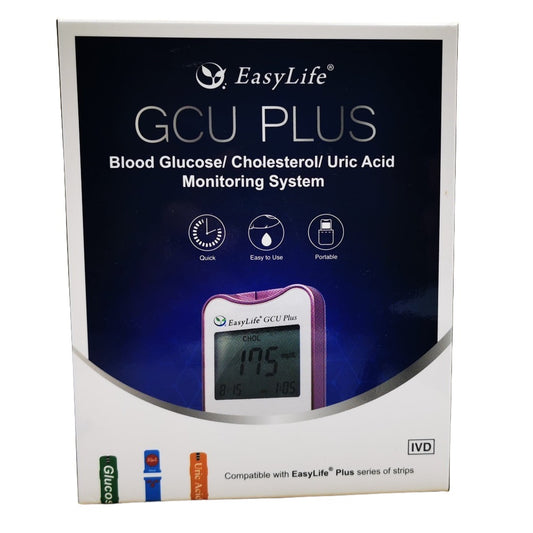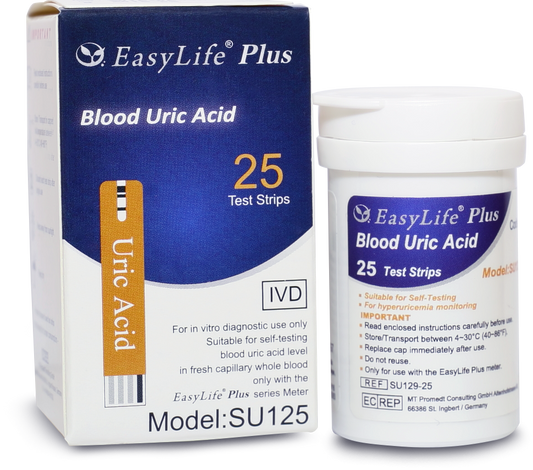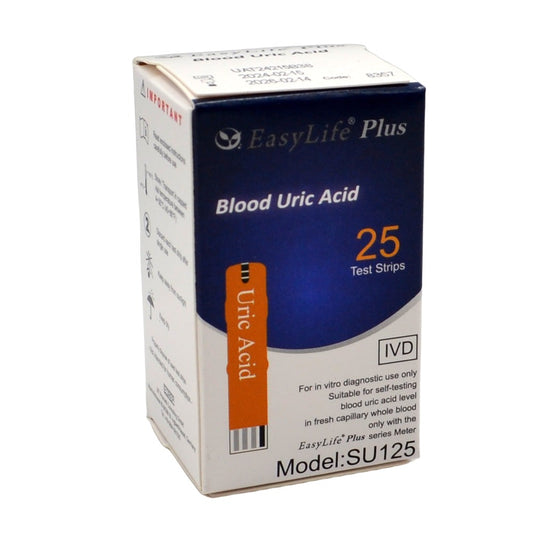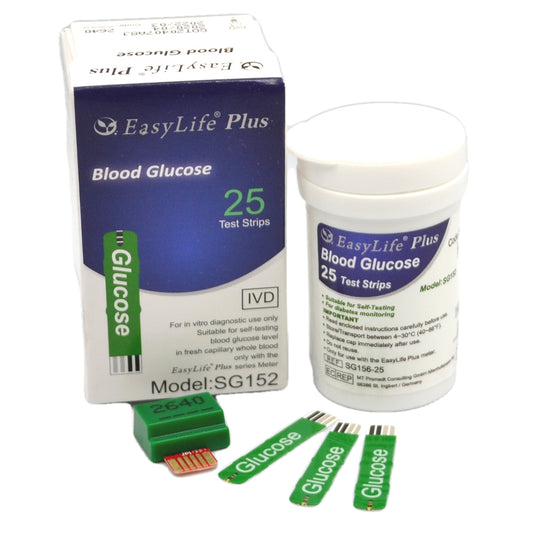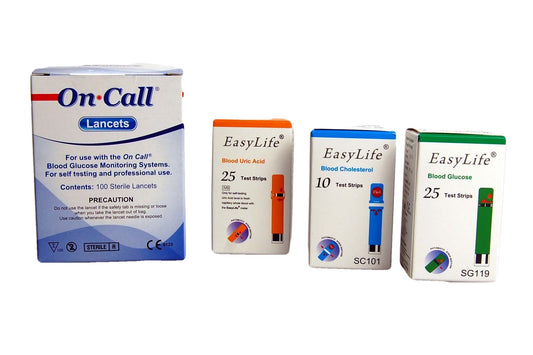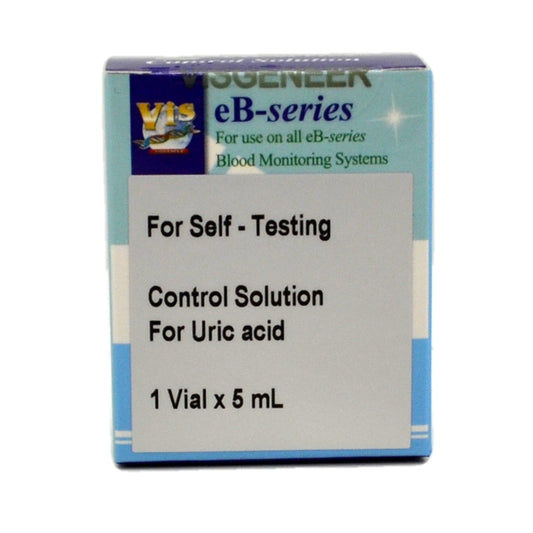Collection: Uric Acid Meter and Test Strips
We have a range of quick, easy and accurate uric acid test kits and meters which enable you to check your uric acid level in your blood at home.
-
Easylife Plus Blood Uric Acid Meter + 25 Easylife Plus Uric Acid Test Strips + 25 Safety Lancets
4 reviewsRegular price £67.98 GBPRegular priceUnit price / per -
EASYLIFE GCU PLUS Blood Glucose / Total Cholesterol / Uric Acid Meter
6 reviewsRegular price From £49.99 GBPRegular priceUnit price / per -
EASYLIFE Plus Blood Uric Acid Test Strips
3 reviewsRegular price From £17.99 GBPRegular priceUnit price / per -

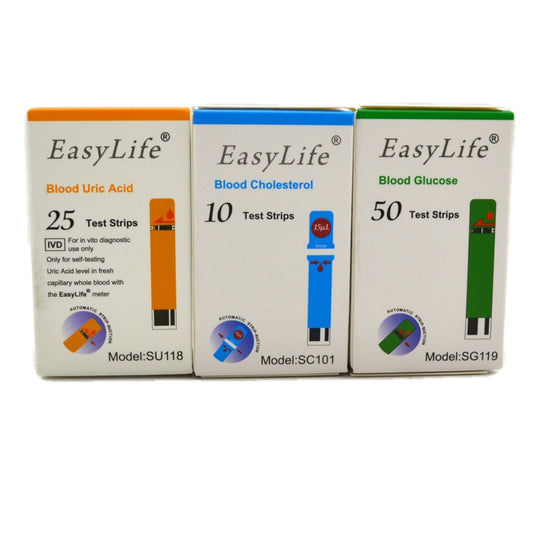
Easylife Test Strips Bundle Pack-50 Glucose / 10 Cholesterol / 25 Uric Acid + 100 Universal Lancets
No reviewsRegular price £46.04 GBPRegular priceUnit price / per£51.52 GBPSale price £46.04 GBPSale -
Easylife Plus Test Strips 25 Glucose / 10 Cholesterol / 25 Uric Acid Test Strips Combo Pack
No reviewsRegular price £39.99 GBPRegular priceUnit price / per£42.48 GBPSale price £39.99 GBPSale -
Easylife Glucose / Cholesterol / Uric Acid Strips Combo Pack + 100 Universal Lancets
No reviewsRegular price £41.99 GBPRegular priceUnit price / per£47.47 GBPSale price £41.99 GBPSold out -
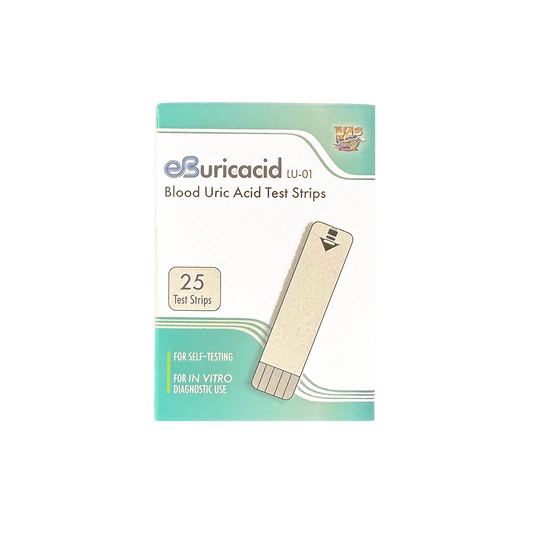
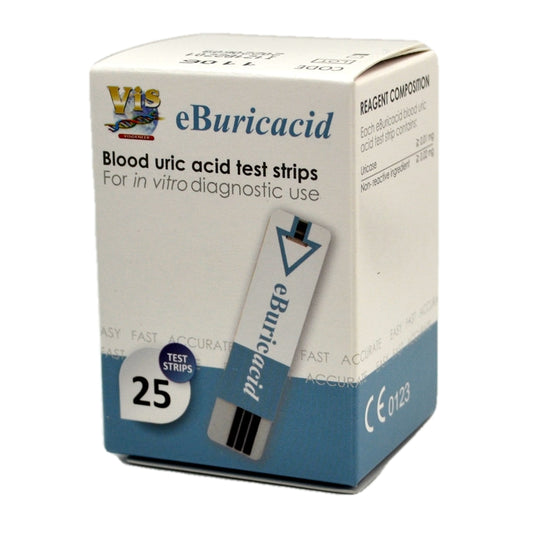 Sold out
Sold out25 eBuricacid Uric Acid Test Strips
1 reviewRegular price £19.77 GBPRegular priceUnit price / per -
eBuricacid Uric Acid Control Solution
No reviewsRegular price £12.99 GBPRegular priceUnit price / per
Which uric acid meter is best to do a uric acid test at home?
You can now buy a uric acid meter and uric acid test kit strips to test and monitor your uric acid levels at home.
We currently offer two uric acid meter systems, both are equally accurate:
- Easylife GCU uric acid meter offers the option to also test blood cholesterol and glucose levels in addition to a uric acid test. Raised uric acid levels are often associated with diabetes or pre-diabetes and raised cholesterol as part of the metabolic syndrome.
- Eburicacid meter and uric acid test kits ,is a dedicated uric acid meter and test strips, and is the best value option if you are just interested in testing uric acid levels.
Performing a uric acid test at home
A uric acid test is a blood test that measures the level of uric acid in your blood. The test helps determine whether your body is producing too much uric acid, or if your kidneys are not excreting it efficiently.
How is the uric acid test performed at home
The uric acid test involves drawing a small sample of blood from a finger prick.
Why measure uric acid level at home?
Uric acid is the chemical in the blood that is elevated in Gout. Measuring uric acid levels in the blood is important for several reasons, primarily related to diagnosing and managing conditions associated with high levels of uric acid.
Here are the key reasons why uric acid levels are measured:
- Diagnosing gout: High levels of uric acid can lead to the formation of urate crystals in the joints, causing gout, which is a type of arthritis characterized by sudden, severe attacks of pain, swelling, redness, and tenderness in the joints. Measuring uric acid levels can help diagnose gout and monitor its treatment.
- Identifying kidney stones: Uric acid can also crystallise in the kidneys, forming kidney stones. People with high uric acid levels are at increased risk of developing uric acid kidney stones. Monitoring uric acid levels is important in the management and prevention of kidney stones.
- Monitoring other health conditions: High uric acid levels can be associated with other health conditions, including kidney disease and certain metabolic conditions including diabetes. Monitoring uric acid levels can help in the diagnosis and management of these conditions.
- Treatment effectiveness: For patients already diagnosed with gout, kidney stones, or related conditions, measuring uric acid levels helps healthcare providers determine the effectiveness of treatment regimens aimed at lowering uric acid levels. If you are following a uric acid lowering diet, monitoring your uric acid levels at home, also allows you to monitor how effective the dietary changes have been.
- Evaluating risk: For individuals who have a family history of gout or kidney stones, measuring blood uric acid levels can help assess their risk of developing these conditions.
- Preventive health care: In some cases, elevated uric acid levels in the blood may not cause immediate symptoms (asymptomatic hyperuricemia), but monitoring these levels can be important in preventing future health issues.
What is uric acid?
Uric acid is a chemical compound that's created when the body breaks down substances called purines. Purines are found in your body's tissues and in many foods, like liver, anchovies, mackerel, dried beans, and beer. Normally, uric acid dissolves in your blood and passes through your kidneys into your urine. In some cases, however, your body either produces too much uric acid or your kidneys excrete too little. When this happens, uric acid can build up, forming sharp, needle-like urate crystals in a joint or surrounding tissue that cause pain, inflammation, and swelling. This condition is known as gout, which is a form of arthritis.
High levels of uric acid in the blood, also known as hyperuricemia, can also lead to other health issues, including kidney stones and kidney failure. It's worth noting, however, that not everyone with high uric acid levels will develop gout or kidney problems. Some people may have high uric acid levels without experiencing any symptoms or complications.
The level of uric acid in your blood can be determined by a blood test. Managing high uric acid levels often involves medication to reduce uric acid production or increase its excretion, along with lifestyle and dietary changes to maintain a healthy balance.
How do you do a uric acid test at home?
A uric acid monitor measures the level of uric acid on a finger prick blood sample and gives a result in minutes. The Easylife uric acid meter is a complete starter pack with everything that you need to start testing blood uric acid levels immediately, and it is suitable for home or professional use
Both the uric acid meters and uric acid test strips that we stock are suitable to test uric acid levels at home. The Easylife uric acid meter can also test also blood for cholesterol and glucose. The Eburic uric acid meter just checks uric acid levels.
What is the best time of day to check your blood uric acid levels at home?
The best time of day to check your blood uric acid levels at home typically depends on several factors, including consistency, fasting state, and minimising external influences. Uric acid levels in the blood are influenced by food intake so when you are fasting. typically, a 6-8 hour fast (which naturally occurs overnight) is an ideal time to see what your baseline levels are.
Testing your uric acid level first thing in the morning after an overnight fast provides the most consistent and comparable results. This is because your body's metabolic processes stabilise during sleep, and external factors like diet and physical activity haven't yet influenced your levels of uric acid in the blood.
If morning testing is not feasible, checking your uric acid levels before meals is another good option. This helps avoid the immediate effects of recent food and beverage consumption on uric acid levels.
Why is testing uric acid levels important?
High levels of uric acid in the blood can be associated with conditions such as gout, kidney stones, and certain types of kidney disease. Gout is a form of arthritis that occurs when there is an accumulation of uric acid crystals in the joints, leading to inflammation and pain.
A uric acid test is often ordered if a GP or doctor suspects that a person may have a condition related to high uric acid levels. It can help diagnose and monitor conditions such as gout and kidney stones. Treatment for elevated uric acid levels in the blood may involve lifestyle changes, medications to lower uric acid levels, and management of any underlying conditions.
It's important to note that while a uric acid test can provide valuable information, it is typically just one part of a larger diagnostic process. Doctors consider the uric acid test results along with the individual's medical history, symptoms, and other laboratory tests to make an accurate diagnosis and develop an appropriate treatment plan. You may find our FAQ section below helpful.
Collapsible content
Can I check my uric acid level at home?
It's now possible to check your uric acid levels at home using commercially available uric acid test kits and a meter. It's important to note that these uric acid tests may not be as comprehensive as those conducted in a clinical laboratory, but they are a very useful tool to monitor your uric acid levels.
Are uric acid home tests accurate?
This home uric acid test meter and strips is 97% accurate when compared to a laboratory uric acid. The meter tests a small blood sample obtained from a finger prick, to measure uric acid levels, whereas a laboratory test performed by your doctor will usually be done on a larger blood sample, obtained by venepuncture. The lab uric acid tests will usually be more comprehensive as the test is performed on a much larger blood sample, so it is still worth having your levels checked with your doctor from time to time.
What are normal Uric Acid Levels?
Here are the normal blood ranges for Uric Acid.
Adult Males between 200 – 430 umol/L
Adult Females between 140 – 360 umol/L
Uric acid (urate) is produced during the breakdown of purines and excreted in both urine and faeces. Not everyone with elevated uric acid gets gout, only if crystals form in synovial joints.
Reasons to measure uric Acid
Uric acid can be elevated in pregnancy (uric acid may be measured while investigation/monitoring pre-eclampsia) during chemotherapy and radiotherapy. Uric Acid is also monitored in cases of renal failure and Liver disease resulting from excessive use of alcohol, starvation. Other rarer causes of high uric acid include a high-protein diet and strenuous exercise. Elevated levels are also seen in the rare inherited disorder, Lesch-Nyhan syndrome.
Low uric acid levels also occur in severe liver disease, low protein diet, heavy metal poisoning, Wilson's disease, and some cancers.
Some drugs will affect uric acid levels. These include, raised levels caused by thiazide diuretics, theophylline and low-dose aspirin;
Low blood Uric Acid levels can occur with high-dose aspirin, corticosteroids, and allopurinol.
When is the best time of day for a uric acid test?
For the most accurate and consistent readings of your blood uric acid levels, testing in the morning after an overnight fast is generally recommended. This approach minimizes the influence of dietary and physiological variations throughout the day.
Does high uric acid levels run in families?
Yes, there is a genetic component to high uric acid levels, and the risk of hyperuricemia (elevated uric acid in the blood) and gout tends to run in families. If one or more close relatives, such as parents or siblings, have a history of gout or elevated uric acid, your risk of experiencing similar issues may be higher.
Genetics can influence how the body processes and eliminates uric acid. Variations in genes related to purine metabolism and uric acid excretion by the kidneys can contribute to the development of hyperuricemia. However, it's important to note that genetics is just one factor, and environmental factors, diet, lifestyle choices, and overall health also play crucial roles.
If there is a family history of gout or hyperuricemia, it may be wise to be proactive in managing lifestyle factors that can influence uric acid levels. This includes maintaining a healthy weight, staying hydrated, avoiding excessive alcohol consumption, and making dietary choices that minimise the intake of purine-rich foods.
Why is my uric acid high but I have no gout symptoms?
Elevated uric acid levels without the presence of gout symptoms is a situation known as hyperuricemia. Hyperuricemia occurs when there is an excess of uric acid in the blood. While gout is one of the conditions associated with high uric acid levels, not everyone with elevated uric acid will develop gout.
It's important to note that even without gout symptoms, persistently high uric acid levels may have implications for long-term joint health and could potentially contribute to other health issues. Regular monitoring and consultation with a healthcare professional are recommended, especially if you have risk factors for gout or other related conditions.
How do you lower uric acid levels naturally?
Lowering uric acid levels naturally involves making lifestyle and dietary changes. Here are some tips that may help reduce uric acid levels:
- Hydration: Drink plenty of water to help flush out uric acid from the body. Aim for at least 8 glasses (64 ounces) of water per day, and more if you are physically active or live in a hot climate.
- Limit purine-rich foods: Reduce intake of foods high in purines, such as organ meats, seafood (especially anchovies and sardines), red meat, and certain vegetables (like asparagus and spinach). Instead, focus on a well-balanced diet that includes a variety of fruits, vegetables, whole grains, and lean proteins.
- Cherries: Some studies suggest that cherries and cherry juice may help lower uric acid levels. Consider incorporating fresh cherries or unsweetened cherry juice into your diet.
- Berries: Include berries like strawberries, blueberries, and blackberries in your diet. They are rich in antioxidants and may have anti-inflammatory effects.
- Low-fat dairy: Consuming low-fat dairy products, such as milk, yogurt, and cheese, may help lower uric acid levels. The proteins in dairy may have a protective effect against gout.
- Vitamin C: Foods rich in vitamin C, such as citrus fruits, bell peppers, and strawberries, may help lower uric acid levels. Consider incorporating these foods into your diet or taking a vitamin C supplement after consulting with a healthcare professional.
- Coffee: Some studies suggest that moderate coffee consumption may be associated with a lower risk of gout. However, individual responses can vary, and excessive caffeine intake should be avoided.
- Maintain a healthy weight: Losing excess weight can help lower uric acid levels. However, avoid crash diets, as rapid weight loss can temporarily increase uric acid levels.
- Limit alcohol: Alcohol, especially beer, has been linked to higher uric acid levels. Limit alcohol consumption or avoid it altogether, particularly if you have gout.
- Regular exercise: Engage in regular physical activity to help maintain a healthy weight and improve overall well-being. However, avoid intense exercise during gout flares.
Are there any foods that can reduce uric acid levels in the blood?
If you're looking to reduce uric acid levels, incorporating certain foods into your diet and adopting a healthy lifestyle can be beneficial. Here are some foods and dietary practices that may help lower uric acid levels:
- Cherries: Some studies suggest that cherries and cherry juice may help reduce uric acid levels and decrease the frequency of gout attacks.
- Berries: Berries, such as strawberries, blueberries, and blackberries, are rich in antioxidants and may have anti-inflammatory effects.
- Apples: Apples contain malic acid, which may help neutralise uric acid and contribute to its elimination from the body.
- Citrus fruits: Citrus fruits like oranges, lemons, and grapefruits contain vitamin C, which may help lower uric acid levels.
- Low-fat dairy products: Low-fat dairy, such as milk, yogurt, and cheese, may help lower uric acid levels. Some studies suggest that the proteins in dairy products may have a protective effect against gout.
- Vegetables: Most vegetables are low in purines, and some, like kale, cabbage, and broccoli, may have anti-inflammatory properties.
- Whole grains: Foods like whole wheat, brown rice, and oats are high in fiber and may help regulate uric acid levels.
- Water: Staying well-hydrated is crucial for flushing out uric acid from the body. Aim to drink plenty of water throughout the day.
- Coffee: Some studies suggest that moderate coffee consumption may be associated with a lower risk of gout. However, individual responses can vary.
- Herbs and spices: Some herbs and spices, such as turmeric and ginger, have anti-inflammatory properties and may be beneficial.
What foods increase uric acid levels in the blood?
Certain foods are known to be high in purines, which can increase the levels of uric acid in the blood. High levels of uric acid can contribute to conditions like gout. It's important to note that individual responses to specific foods can vary, and not everyone will be affected in the same way. Here are some foods that are generally considered to be high in purines:
- Organ meats: Liver, kidneys, and other organ meats tend to be high in purines.
- Certain seafood: Some types of seafood are rich in purines. Examples include anchovies, sardines, mussels, scallops, and trout.
- Red meat: Beef, lamb, and pork can contribute to higher purine levels.
- Game meats: Meats from game animals like venison and rabbit can be high in purines.
- Processed meats: Certain processed meats, such as hot dogs and sausages, may contain higher levels of purines.
- Alcohol: Beer and spirits, especially beer, have been associated with an increased risk of gout due to their purine content.
- Certain vegetables: While most vegetables are low in purines, some high-purine vegetables include asparagus and spinach. However, the purine content in vegetables is generally lower compared to meat and seafood.
How do you prepare for a uric acid blood test?
No special preparation is required for a uric acid test. You do not need to fast and it can be done at any time of day, although a fasted uric acid test first thing in the morning will usually give you the most consistent results, as food intake, exercise and fluid intake can affect the uric acid levels later in the day.
Can you give me any tips on obtaining the finger prick blood sample?
Obtaining a good finger prick blood sample is crucial to getting accurate results with any home blood test. We have created a video for each product which shows a great demonstration of exactly how you should be using the lancets and test provided, and the prep needed to perfuse the fingers.
We have put together our top tips on performing a finger prick blood test to help you here
Can you use a lancet without an auto lancing device?
A lancet can be used alone or with a lancing device. Many people find it easier to obtain a finger prick blood sample if they use the lancet in a lancing device.
Most of our meters are supplied with starter packs of lancets and some with safety lancets. We suggest you continue to use the same lancets recommended by the manufacturer if possible. If you are struggling to get adequate samples move to a thicker lance, ie 21g is thicker than 28g or 30g (the thinnest)
Is there a relationship between blood cholesterol levels and raised uric acid levels?
Yes, there is a significant relationship between raised blood cholesterol levels and elevated uric acid levels. Both conditions often co-exist and are linked through several metabolic and physiological pathways. This association is observed in various clinical settings and is influenced by shared risk factors and underlying mechanisms. You can buy a combined meter to test your blood cholesterol levels and your uric acid levels at home.
Is there a relationship between high uric acid levels and diabetes?
Yes, there is a notable relationship between high uric acid levels and diabetes. Elevated uric acid, a condition known as hyperuricemia, is often observed in individuals with diabetes, and research suggests it may play a role in the development and progression of both type 1 and type 2 diabetes. You can buy a combined meter to test your blood glucose levels and your uric acid levels at home.



